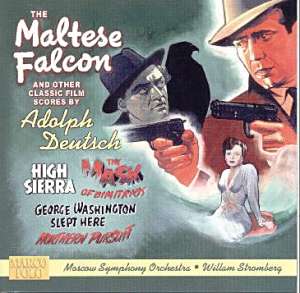************************************************************** EDITOR’s RECOMMENDATION June 2002 **************************************************************
Compilation: Adolph DEUTSCH
Classic Film Scores for Warner Bros. 1941-44: The Maltese Falcon; High Sierra; The Mask of Dimitrios; George Washington Slept Here; Northern Pursuit
MARCO POLO 8.225169 [75:51]

Leo B. Forbstein’s prime musical talent at Warner Bros., Max Steiner, Erich Wolfgang Korngold and Franz Waxman clearly had the plum scoring jobs but such was the studio’s volume of output that there was room for the work of other composers. Probably the most significant of these was Adolph Deutsch. Deutsch had come to Hollywood with a talent and experience more suited to musicals but since Warners 1940s output of this genre was comparatively limited and given to Ray Heindorf, Deutsch was invariably given dramas of mystery, adventure and violence. These five scores represent the cream of his work at Warner Bros. He left Warners in 1945 and moved on to Paramount and then MGM where his talent for musicals was appreciated and fully used. He was very scrupulous about following composers’ intentions and his meticulous music direction at MGM won him an Oscars for Annie Get Your Gun (reviewed on this site this month), Seven Brides for Seven Brothers, and Oklahoma (on loan out to 20th Century Fox). He also worked on Show Boat and The Band Wagon.
The Maltese Falcon suite opens with Steiner’s Warner Bros, fanfare but segueing out in B flat (like most of the scores on this album) a lower key than Steiner normally used in keeping with the film’s moody dark, mysterious atmosphere and intrigue. Deutsch, while keeping close to the Warner Bros house style, produces an inventive, tense, densely textured, polytonal score full of swirling frenzied figures. The pace is often fast and furious and edged with a sardonic wit appropriate to the sardonic wit of Sam Spade (Humphrey Bogart) and Kasper Gutman (Sidney Greenstreet in his first film but the role of his career). Relief comes in the End Cast music with a ‘Quasi Fox Trot.’ A very exciting suite.
The far less known The Mask of Dimitrios, based on a novel by Eric Ambler, was something of a curiosity for it had no stars, the actors were all supporting players led by Peter Lorre as a Dutch detective story writer who becomes obsessed with the mysterious career of a man named Dimitrios (Zachary Sciott in his first screen role) whose corpse he sees in a Turkish morgue. Dimitrios turns out to be very much alive and extremely dangerous. Lorre in tracking him down comes across all sorts of colourful characters (played by the likes of Sydney Greenstreet and Victor Francen etc) Deutsch’s score, for a large orchestra, is very much in the spirit of The Maltese Falcon, but even more sophisticated, more advanced harmonically. It is darkly atmospheric but with exotic colourings according to its locales but with flashes of wit and character.
High Sierra is the earliest of Deutsch’s scores included in this album. The film starred Humphrey Bogart as mad Roy Earle, a Dillinger-like figure but with a heart of gold (befriending a dog and helping Velma, a disabled girl, played by Joan Leslie, who rejects his love). Earle, on parole from prison, is involved in a robbery that goes wrong and is pursued, to his death, into California’s Yosemite Mountains. This score is more melodic and leans more towards Max Steiner’s idiom. The towering Main Title theme speaks of the natural grandeur of the mountains before the mood darkens to intimate the criminality and tragedy of Roy Earle. ‘Velma’s Plight’ starts and ends with a cake-walk but the lovely central section has "star" music with celestial evocations on celesta and vibraphone plus fiddle solo and high strings for a wistful encounter between Earle and Velma.
George Washington Slept Here starred Jack Benny and Ann Sheridan. It was clearly a comedy (that anticipated Mr Blandings Builds His Dream House and The Egg and I). It was clearly a change of pace for Deutsch who relished creating a style close to Warner Bros. cartoon capers peppered with many source material references.
Deutsch’s only Erroll Flynn score was Northern Pursuit a tale of the Canadian Mounties vs Nazi spies worked out in the Northern icy wildernesses. Deutsch responds with an evocative (including some weird chill blizzard harmonics) thrilling, fast-paced score for a large orchestra that employs five percussion players as well as two pianos, novachord and strings. Again the influence is Steiner - and Korngold in a brief relaxed village and sleigh ride sequence. In the tradition of 1940s wartime thrillers there are patriotic references – in this instance the Canadian national song ‘Maple Leaf Forever!’. The mickey-mousing (as elsewhere in this compilation) is handled with such charm and wit that it is not at all disruptive.
The accompanying 28-page booklet while this time eschewing detailed track-by-track analysis is nevertheless very informative. Congratulations to Messrs Morgan and Stromberg for championing another major musical talent from Hollywood’s golden Age. No, gentlemen, how about addressing the music of Frederick Hollander. We have more requests on this site for Hollander’s Sabrina music than any other single score.
Ian Lace

Return to Index